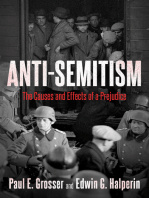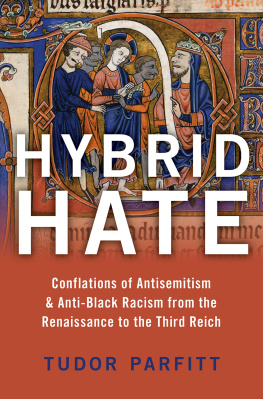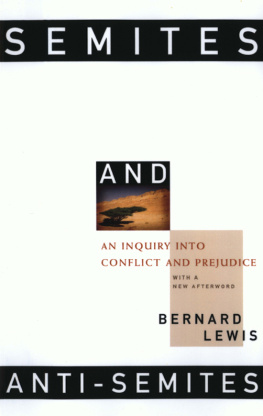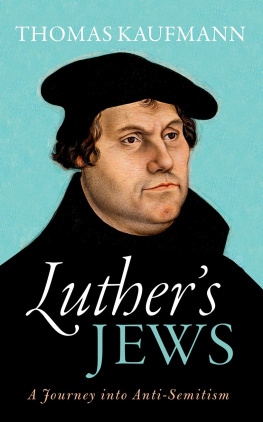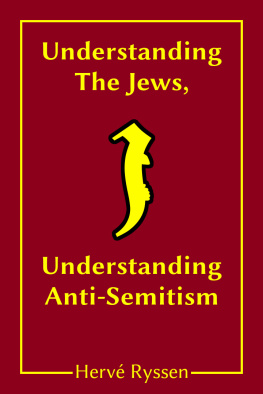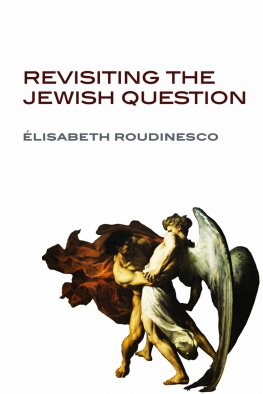TRIALS OF THE DIASPORA
TRIALS OF THE DIASPORA
A HISTORY OF ANTI-SEMITISM IN ENGLAND
ANTHONY JULIUS


Great Clarendon Street, Oxford OX2 6DP
Oxford University Press is a department of the University of Oxford.
It furthers the Universitys objective of excellence in research, scholarship,
and education by publishing worldwide in
Oxford New York
Auckland Cape Town Dar es Salaam Hong Kong Karachi
Kuala Lumpur Madrid Melbourne Mexico City Nairobi
New Delhi Shanghai Taipei Toronto
With offices in
Argentina Austria Brazil Chile Czech Republic France Greece
Guatemala Hungary Italy Japan Poland Portugal Singapore
South Korea Switzerland Thailand Turkey Ukraine Vietnam
Oxford is a registered trade mark of Oxford University Press
in the UK and in certain other countries
Published in the United States
by Oxford University Press Inc., New York
Anthony Julius 2010
The moral rights of the author have been asserted
Database right Oxford University Press (maker)
First published 2010
All rights reserved. No part of this publication may be reproduced,
stored in a retrieval system, or transmitted, in any form or by any means,
without the prior permission in writing of Oxford University Press,
or as expressly permitted by law, or under terms agreed with the appropriate
reprographics rights organization. Enquiries concerning reproduction
outside the scope of the above should be sent to the Rights Department,
Oxford University Press, at the address above
You must not circulate this book in any other binding or cover
and you must impose the same condition on any acquirer
British Library Cataloguing in Publication Data
Data available
Library of Congress Cataloging in Publication Data
Data available
Typeset by SPI Publisher Services, Pondicherry, India
Printed in Great Britain
on acid-free paper by
Clays Ltd, St Ives plc
ISBN 9780199297054
1 3 5 7 9 10 8 6 4 2
Katarina, this book is for you.
Contents
Acknowledgements
Earlier versions of chapters, or parts of chapters, have appeared in Paul Iganski and Barry Kosmin (eds.), A New Antisemitism? (London, 2003), in the online journal Engage, on the website , and in David Kertzer (ed.), Old Demons, New Debates (New York, 2005), as well as in Critical Quarterly, the Jewish Chronicle, the Times Literary Supplement, the London Review of Books, and the Guardian.
I owe specific debts of gratitude to Jane Ashworth, Hadassa Ben-Itto, Lily Bloch, Shimon Cohen, Simon Cohen, Stan Cohen, Jonathan Cummings, Jeffrey Davis, Michael Ezra, Ofir Frankel, R. M. Ginsbury, Daniel Hochhauser, Jonathan Hoffman, Jenifer Howie, Oliver Kamm, Irene Lancaster, Richard Landes, Noam Leshem, James Libson, Robert Jan Van Pelt, Antony Polonsky, Daniel Reisner, Andrew Roberts, Ann Robinson, Bill Rubinstein, Paul Usiskin, and Michael Yudkin. I am particularly grateful to Todd Endelmann, Deborah Lipstadt, and Ken Stern for convening a one-day conference in NYC on my manuscript.
Elena Schiff has been indefatigable on the books behalf. I thank her for all her work on it; I cannot imagine completing it without her help. It was at Andrew Wylies suggestion that I started to think about writing this bookI thank him, and Tracey Bohan too.
The following read all, or some part, of the book: John H. Arnold, Jane Ashworth, Anthony Bale, Steve Bayme, Paul Bew, Marcel Borden, Ben Cohen, Nick Cohen, Deborah Dwork, Richard Evans, David Feldman, Geoffrey Field, Jonathan Freedland, Norman Geras, Sander L. Gilman, Dean Godson, Bernard Harrison, David Hirsh, Dan Jacobson, Howard Jacobson, Menachem Kellner, Michael Kotzin, Shalom Lappin, Deborah Lipstadt, Colin McCabe, Derek Penslar, David Plante, Felix Posen, Aviva Raz-Shechter, W. D. Rubinstein, Ken Stern, Michael Yudkin, and Steve Zipperstein. These are all very busy people; I am grateful to them for taking the time and for offering their comments. Each one of them has improved the book.
Trials of the Diaspora began as a project under the vigilant, engaged care of the late Nikos Stangos, my very dear and still-mourned friend, and the editor of two of my earlier books. I hope he would have been pleased with the final product, even though it appears under the imprint of a publishing house other than his own. In the event, I could not have wished for a better publisher than OUP. I was lucky enough to have Luciana OFlaherty as my editor (and thank you Claire Pinder for the introduction). She has been exemplary, both patient and enthusiastic.
Writing this book has been somewhat like swimming long-distance through a sewer. Family, friends, and colleagues, have provided welcome distractions, and I thank them allthe children, especially. Max helped with some research early on, Laura kept me politically in line, Chloe contributed some scholarship on John Singer Sargent, Theo read the whole manuscript shortly before it was finalized, all the while negotiating GCSE and physical training commitments, and Elon took a special interest in the books length (word count, number of pages), sitting on his perch at my desk. The books dedication is a token of my dedication.
I do not wish to take up the cudgels for the Jews in this pamphlet. It would be useless. Everything rational and everything sentimental that can possibly be said in their defence has been said already.
Theodore Herzl, The Jewish State
... it is easy to be a Jew in England...
Chaim Weitzmann, Statement to the Palestine Royal Commission (1936)
If you want to know the character of any nation, ask the Jews.
Chaim A. Kaplan, Warsaw Diary
The Jews have contrived, in these few years of unconditional freedom, to place themselves again on trial before public opinion.
Anonymous contributor, London Quarterly Review, October 1882
In the modern world, the Jew has perpetually been on trial; still today the Jew is on trial, in the person of the Israeliand this modern trial of the Jew, this trial which never ends, begins with the trial of Shylock.
Philip Roth, Operation Shylock
Introduction
Experiences of many kinds go into the writing of a bookmore of them, indeed, than the writer himself can ever know. Only some of them survive as memories.
Many years ago, I took a train journey to Birmingham with my father and a non-Jewish business associate whom I will call Arthur. I was ten or eleven years old at the time, and I would often tag along on these business trips, when school allowed. My father owned a number of menswear shops, mainly in the West Country. He had enjoyed considerable success in business, and it was a familiar experience for me to see him in the company of other businessmen seeking his advice or asking for favours. Arthur was one such man, and his conversations with my father always had a slightly cloying, ingratiating quality. I remember that on this occasion he was talking about his daughter, who was about my age but whom I had not met. Arthur rambled on, my father patiently listening, while I read a book.
And then Arthur said something like the following: Do you know, Morris, she has got a special little friend, a Jewish girl, and we had the girl over for tea last weekend. I must say, the child has got the most beautiful manners. He beamed. I had a sense of the temperature in the compartment rising, but nothing else was said on the subject, and after a short period, Arthur wandered off to the dining car to buy a drink. My father turned to me, fuming. Did you hear what he said? I am supposed to be impressed that he actually had a Jewish girl over to his house for tea? And that she had beautiful manners? So what are you going to say, Daddy? I asked. Nothing, of course. What is there to say? Shortly afterwards, Arthur returned, and the two men resumed their conversation, chatting together until we arrived at our destination.
Next page


